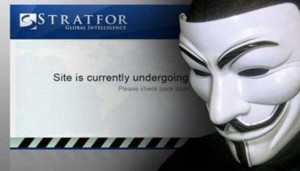SUMMARY: Wikileaks has published five million emails from Stratfor, an intelligence company based in Texas that, looking at their practices, appears to be America’s very own privately run CIA. According to Wikileaks, their deals would also include the use of privileged information to make money in financial markets. Stratfor’s clients are the US Government, other countries and military organizations, as well as private companies like Lockheed Martin, Northrop Grumman or Raytheon. They have a global network of spies in governments and media companies, including “secret deals with dozens of media organizations and journalists, from Reuters to the Kiev Post.” According to the emails, these spies get paid in Swiss bank accounts and pre-paid credit cards. MORE
WASHINGTON POST: An initial examination of the emails turned up a mix of the innocuous and the embarrassing, but WikiLeaks chief Julian Assange promised more explosive material in the coming weeks. “What we have discovered is a company that is a private intelligence Enron,” Assange told London’s Frontline Club, referring to the Texas energy giant whose spectacular bankruptcy turned it into a byword for corporate malfeasance. Assange accused Stratfor of funneling money to informants through offshore tax havens, monitoring activist groups on behalf of big corporations and making investments based on its secret intelligence. MORE
Feb. 27, 2012
FOR IMMEDIATE RELEASE
MASSIVE LEAK REVEALS CRIMINALITY, PARANOIA AMONG CORPORATE TITANS
Dow pays “strategic intelligence” firm to spy on Yes Men and grassroots activists. Takeaway: movement is on the right track!
WikiLeaks begins to publish today over five million e-mails obtained by Anonymous from “global intelligence” company Stratfor. The emails, which reveal everything from sinister spy tactics to an insider trading scheme with Goldman Sachs (see below), also include several discussions of the Yes Men and Bhopal activists. (Bhopal activists seek redress for the 1984 Dow Chemical/Union Carbide gas disaster in Bhopal, India, that led to thousands of deaths, injuries in more than half a million people, and lasting environmental damage.)Many of the Bhopal-related emails, addressed from Stratfor to Dow and Union Carbide public relations directors, reveal concern that, in
the lead-up to the 25th anniversary of the Bhopal disaster, the Bhopal issue might be expanded into an effective systemic critique of corporate rule, and speculate at length about why this hasn’t yet happened—providing a fascinating window onto what at least some corporate types fear most from activists.
“[Bhopal activists] have made a slight nod toward expanded activity, but never followed through on it—the idea of ‘other Bhopals’ that were the fault of Dow or others,” mused Joseph de Feo, who is listed in one online source as a “Briefer” for Stratfor.“Maybe the Yes Men were the pinnacle. They made an argument in their way on their terms—that this is a corporate problem and a part of the a [sic] larger whole,” wrote Kathleen Morson, Stratfor’s Director of Policy Analysis. “With less than a month to go [until the 25th anniversary], you’d think that the major players—especially Amnesty—would have branched out from Bhopal to make a broader set of issues. I don’t see any evidence of it,” wrote Bart Mongoven, Stratfor’s Vice President, in November 2004. “If they can’t manage to use the 25th anniversary to broaden the issue, they probably won’t be able to.”
Mongoven even speculates on coordination between various activist campaigns that had nothing to do with each other. “The Chevron campaign [in Ecuador] is remarkably similar [to the Dow campaign] in its unrealistic demand. Is it a follow up or an admission that the first thrust failed? Am I missing a node of activity or a major campaign that is to come? Has the Dow campaign been more successful than I think?” It’s almost as if Mongoven assumes the two campaigns were directed from the same central activist headquarters.
Just as Wall Street has at times let slip their fear of the Occupy Wall Street movement, these leaks seem to show that corporate power is most afraid of whatever reveals “the larger whole” and “broader issues,” i.e. whatever brings systemic criminal behavior to light. “Systemic critique could lead to policy changes that would challenge corporate power and profits in a really major way,” noted Joseph Huff-Hannon, recently-promoted Director of Policy Analysis for the Yes Lab.
Among the millions of other leaked Stratfor emails are some that reveal dubious financial practices, including an apparent insider trading
scheme with Goldman Sachs Managing Director Shea Morenz, who joined Stratfor’s board of directors and invested “substantially” more than $4 million in the scheme, called StratCap. “What StratCap will do is use our Stratfor’s intelligence and analysis to trade in a range of geopolitical instruments,” wrote Stratfor CEO George Friedman in September 2011. StratCap was designed through a complex offshore share structure to appear legally independent, but Friedman assured Stratfor staff otherwise: “Do not think of StratCap as an outside organisation. It will be integral… It will be useful to you… We are already working on mock portfolios and trades.” (StratCap has been due to launch in 2012, though that could now change.)
(Stratfor’s “confidential intelligence services” clients include, besides Dow and Union Carbide, the US Department of Homeland Security, the US Marines, the US Defense Intelligence Agency, Lockheed Martin, Northrop Grumman, and Raytheon.) Perhaps most entertainingly of all, the email trove reveals that Stratfor’s “Confederation Partners”—an unethical alliance between Stratfor and a number of mainstream journalists—are referred to informally within Stratfor as its “Confed Fuck House.” (Another discovery: Coca Cola was spying on PETA. More such gems are sure to surface as operatives sift through the 5.5 million emails.)
CNET: The hack also sheds light on a company that had previously been flying under the radar. Stratfor says that it’s a “subscription-based provider of geopolitical analysis” that provides people and corporations with a “thorough understanding of international affairs.” Critics like WikiLeaks, however, say the organization engages in “confidential intelligence services” that it provides to both the U.S. government and major government contractors, including Lockheed Martin and Northrop Grumman. “The Stratfor e-mails reveal a company that cultivates close ties with US government agencies and employs former US government staff,” WikiLeaks wrote today on its Web site. “It is preparing the 3-year Forecast for the Commandant of the US Marine Corps, and it trains U.S. Marines and “other government intelligence agencies” in ‘becoming government Stratfors.’ Stratfor’s vice-president for intelligence, Fred Burton, was formerly a special agent with the U.S. State Department’s Diplomatic Security Service and was their deputy chief of the counterterrorism division.” MORE
STRATFOR: Some of the emails being published “may be forged or altered to include inaccuracies; some may be authentic,” the company statement  said. “We will not validate either. Nor will we explain the thinking that went into them. Having had our property stolen, we will not be victimized twice by submitting to questioning about them,” the statement said. MORE
said. “We will not validate either. Nor will we explain the thinking that went into them. Having had our property stolen, we will not be victimized twice by submitting to questioning about them,” the statement said. MORE
GIZMODO: Or maybe that’s part of a disinformation campaign to question the credibility of all the emails. After all, the article is from Reuters. Who knows at this point. MORE
WASHINGTON POST: Another Stratfor email warned about letting people know too much about how the company operated. “I think showing too much of our inner workings devalues our Mystique,” the email said. “People don’t know how we collect our intelligence and that’s one of the cool, mysterious things about STRATFOR.” MORE

